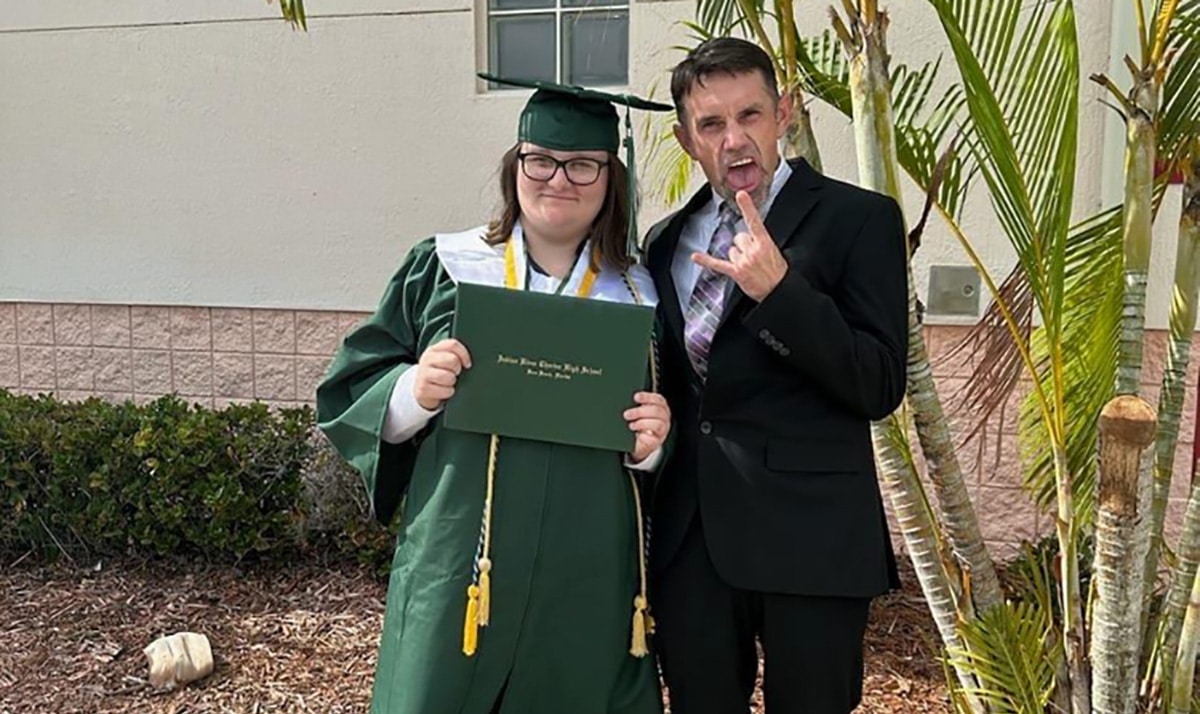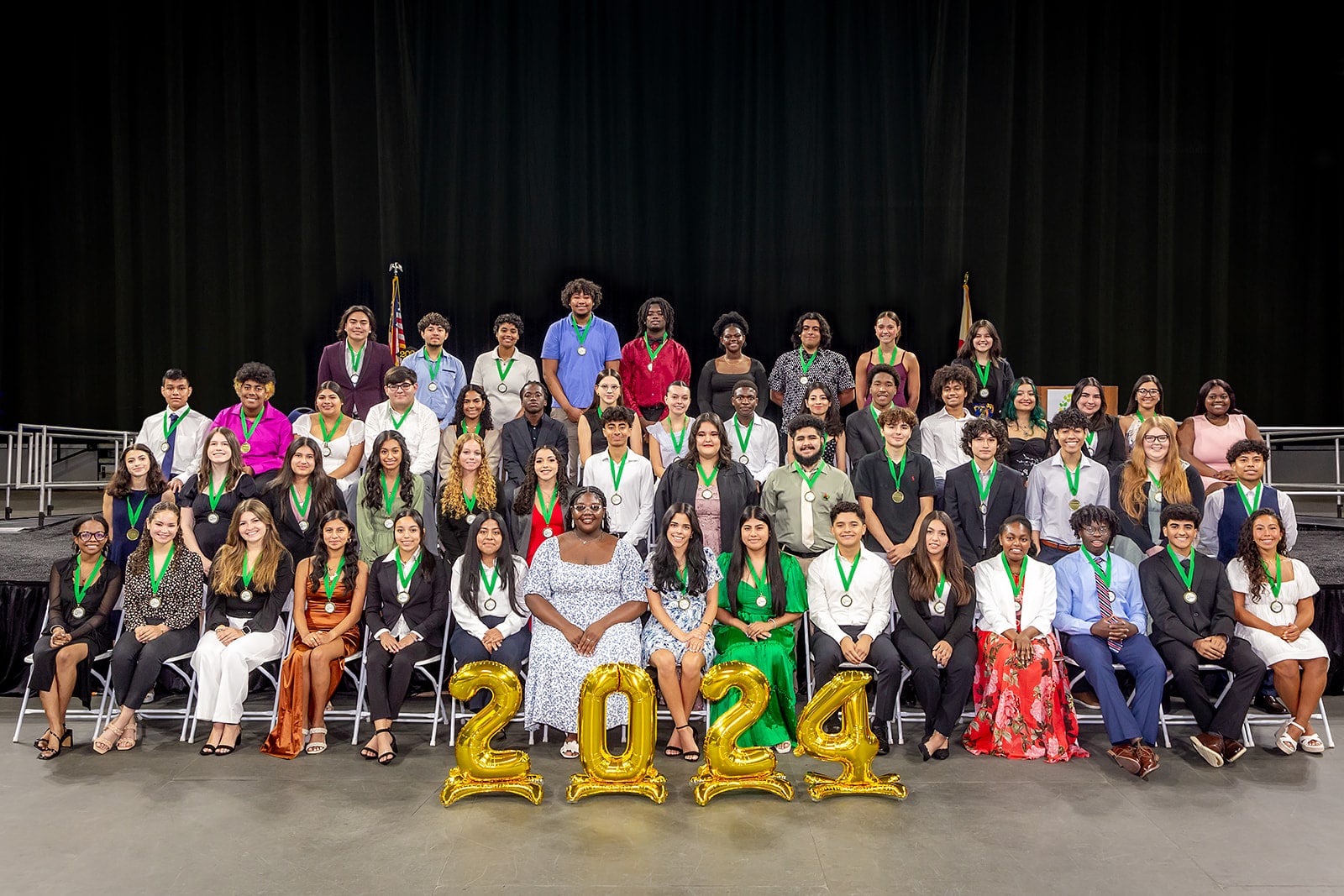
Photo: First-Gen student, Kaydence Johnson poses with her father after graduating from Indian River Charter High School Graduation in Vero Beach, FL. on May 20th, 2023.
Growing up, Kaydence Johnson often went stargazing with her father. Eventually, those short nights grew into one of the most important aspects of Johnson’s life – a love for astronomy and fascination with rockets.
“This passion grew into an interest in aerospace engineering which led to a general interest in all engineering fields,” said Johnson, a mechanical engineering student from Polk County studying at Florida Polytechnic University. “Back then, I found myself so happy learning and creating new things, as if it was part of my nature. I still feel that way to this day.”
Money was always tight for Johnson’s family. Although both of her parents graduated high school and worked hard, they hadn’t had the chance to pursue further education and faced financial limitations as a result. From an early age, Johnson developed a mindset that college would be too far reaching.
“College was often discussed as very expensive and unattainable for someone like me. I didn’t know anyone who had gone to college, so it was easy for me to believe I couldn’t do it either, Johnson said.
A path to college became clear during high school thanks to teachers and peers that help her learn about scholarship opportunities and help reduce the financial burden of attending college.
As a first-generation college student, Johnson’s experience is not unique. In the U.S., roughly fifty percent of college students identify as a first-generation student, according to the National Association of Student Personnel Administrators (NASPA). First-Gen students can be defined as being the first in their family to attend college, students whose parents did not graduate from a two- or four-year college in the United States, or whose parents completed their degrees as nontraditional students over the age of 25.
In Florida, twenty-seven percent of college students are considered first-generation, according to a national postsecondary survey by the National Center for Education Statistics. Many First-Gen are unaware that as trailblazers, they are navigating higher education without the same support or knowledge compared to continuous-generation students. Fortunately, there are several community organizations throughout Florida leading education programs and creating tailored resources that help students learn about taking the journey through higher education.
Championing college readiness
Champions For Learning, a volunteer-driven organization in Collier County is focused on serving students wanting to pursue higher education. Through their collaboration and participation in the Take Stock in Children program –– a statewide mentoring and scholarship organization –– students receive guidance to successfully complete high school and enroll in college. They currently have 223 students and over half of them are First-Gen who qualify for free or reduced lunch. Students apply for Champion’s Take Stock program as eighth graders, at a time when families are thinking about affording college. Once in the multi-year program, students are paired with volunteer mentors, attend college readiness workshops, receive one-on-one college and career coaching, and postsecondary scholarships. Statewide, 92% of all Take Stock students who complete the program are enrolled in a postsecondary educational program and are utilizing their Take Stock scholarship that provides financial support for college, motivating them to map out and pursue their educational goals with confidence.
“As I made my way through the program, I was inspired to pursue college because I wanted to be in a career field that helped people in my community,” said Yuliana Lara, a First-Gen college graduate from Florida Gulf Coast University who is now working as a College & Career Coordinator at Champions For Learning.

2024 Champions For Learning Student Program class photo, courtesy of Champions For Learning.
For Lara, the First-Gen experience is about career aspirations and shared experiences. “Having a spotlight on First-Gen experiences can also inspire others to aspire to pursue a post-secondary education and change not only their lives but their family’s lives.
In Florida, first-generation students represent a diverse group:
- 41% of first-generation students are Hispanic or Latino, 28% are Black, 24% are white, 3% Asian, and 3% multiracial.
- 58% of first-generation students enter programs of study in high-demand fields such as healthcare, engineering, biophysics, computer sciences and business.
- 41% of first-generation students are of working age (between the ages of 26-64 years old) compared to 29% of continuous-generation students.
- 68% of first-generation students are the first sibling in their family to go to college.
- 55% of first-generation students receive federal financial aid for postsecondary education (which included Pell grants) compared to continuous-generation students.
*Source: US Dept. of Education, National Center for Education Statistics.
Creating a sense of belonging
Several academic professionals – who are also first-generation college graduates – at St. Petersburg College (SPC), know how isolating the first-gen experience is and are working together to create a special place for their students, faculty, and staff members. Their efforts are encouraging their community to celebrate first-generation students as trailblazers.
 “We really want students to claim it and own it and to change the language to sort of de-stigmatize it,” said Amber Estlund, Ph.D., associate dean of academic services at SPC.
“We really want students to claim it and own it and to change the language to sort of de-stigmatize it,” said Amber Estlund, Ph.D., associate dean of academic services at SPC.
Estlund and her colleagues now run SPC’s “First to Finished” program, which hosts several events and activities leading up to the annual National First-Gen College Student Day on Nov. 8th.
“We celebrate the courage our first-generation students have to make steps towards bettering themselves and their families through obtaining a certificate or degree that better aligns them towards high wage careers,” said Shannon Ulrich, Ph.D., First to Finished co-lead. “We are committed to guiding first-generation students through the educational path from first to First to Finished!”
Sharing advice through podcasts
 In addition to in-person activities, Florida’s First-Gen students are also hearing from successful first-generation college peers and graduates. Take Stock in College and Career program, an extension of the Take Stock in Children mentoring and scholarship program, provides Take Stock scholars with additional support to connect students to resources and services to promote postsecondary success.
In addition to in-person activities, Florida’s First-Gen students are also hearing from successful first-generation college peers and graduates. Take Stock in College and Career program, an extension of the Take Stock in Children mentoring and scholarship program, provides Take Stock scholars with additional support to connect students to resources and services to promote postsecondary success.
The Take Stock in College and Career program hosts the College Corner Podcast, a podcast that offers tips for success in college, career, and life.
Their latest episode features an inspiring interview with Miami Dade College President Madeline Pumariega, where she shares valuable advice for first-generation college students and scholars.
To join in the national celebration, Take Stock in Student in College and Career Student Ambassadors shared their first-generation student and college graduate stories online through the Take Stock in College and Career Instagram account.
Paving a path
Many first-generation students feel overwhelmed trying to figure out how to afford college. Fifty-five percent of Florida’s first-generation students receive federal financial aid for postsecondary education (which included Pell grants) compared to continuous-generation students, according to a national postsecondary survey by the National Center for Education Statistics.

“Going to college is about knowing you have a place in the world where you can be yourself, make an impact, have a supportive community with you,” said Jannatul Begum, STEM program specialist, alumna at PTC, and first-generation college graduate.
Students often turn to online resources to learn more about the college application process, financial aid, and scholarships. Organizations such as Path to College (PTC) provide much-needed guidance for students wanting to pursue an education beyond college.
PTC is helping students – who are mostly First-Gen – complete the Free Application for Federal Student Aid (FAFSA) form. In addition to FAFSA guidance, they also have free resources available to help students feel college and career ready, including a 3-year academic fellowship with career exploration activities, tutoring, college guidance, and professional development activities.
